Choosing immune-boosting herbs for your tea can naturally strengthen your body's defenses against illness. These herbs are packed with antioxidants, vitamins, and anti-inflammatory compounds that support your immune system. By incorporating herbs like echinacea, elderberry, or ginger into your daily tea routine, you're giving your body extra tools to fight off pathogens. Many of these herbs also offer additional benefits, such as stress relief, digestive support, and respiratory health. You can customize your tea blends to target specific health goals or simply enjoy the diverse flavors and aromas. Exploring the world of immune-boosting herbal teas opens up a wealth of options for enhancing your overall well-being.
Natural Immune System Support
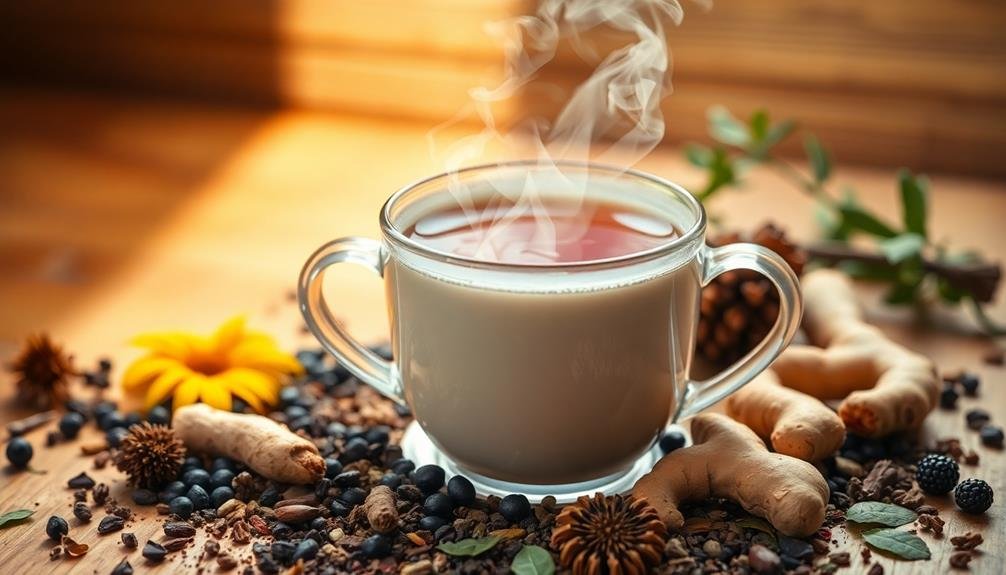
One of the most effective ways to maintain your health is by supporting your immune system naturally. Your body's defense mechanism works tirelessly to protect you from harmful pathogens, but it can benefit from a little help.
That's where immune-boosting herbs come in. These natural allies can strengthen your body's resistance and help you stay healthy year-round.
Incorporating immune-boosting herbs into your daily tea routine is a simple and enjoyable way to support your body's defenses. These herbs contain powerful compounds that can stimulate immune cell production, enhance antibody response, and reduce inflammation.
They're packed with antioxidants that fight free radicals and protect your cells from damage.
Antioxidant-Rich Herbal Options
You'll find that many herbs are packed with antioxidants, making them powerful fighters against free radicals in your body.
These antioxidant-rich options offer protective benefits at the cellular level, helping to maintain your overall health.
Powerful Free Radical Fighters
Several powerful antioxidant-rich herbs can be brewed into teas to combat free radicals in your body. These herbs contain compounds that neutralize harmful molecules, protecting your cells from oxidative stress and supporting your immune system.
Here's a table highlighting some potent free radical fighters you can incorporate into your tea routine:
| Herb | Key Antioxidants |
|---|---|
| Green Tea | Catechins, EGCG |
| Turmeric | Curcumin |
| Ginger | Gingerols, Shogaols |
| Rosehip | Vitamin C, Flavonoids |
| Hibiscus | Anthocyanins, Polyphenols |
When brewing these herbs, you'll reveal their antioxidant potential. Green tea's catechins, particularly EGCG, are renowned for their anti-inflammatory properties. Turmeric's curcumin offers powerful protection against cellular damage. Ginger's compounds not only fight free radicals but also aid digestion. Rosehip, rich in vitamin C, supports collagen production and overall immunity. Hibiscus, with its vibrant color, provides a tart flavor and a boost of anthocyanins.
Protective Cellular Benefits
Brimming with antioxidants, certain herbs offer remarkable protective benefits at the cellular level. When you incorporate these potent plants into your tea, you're providing your body with a powerful defense against oxidative stress and cellular damage. Antioxidants neutralize harmful free radicals, which can wreak havoc on your cells and contribute to various health issues.
By choosing antioxidant-rich herbal teas, you're:
- Supporting overall cellular health
- Reducing inflammation throughout your body
- Protecting against premature aging
- Boosting your immune system's effectiveness
- Potentially lowering your risk of chronic diseases
These protective cellular benefits extend beyond just feeling better; they can have a lasting impact on your long-term health. Herbs like green tea, turmeric, and ginger are particularly renowned for their high antioxidant content.
When you brew these herbs into a soothing cup of tea, you're not only enjoying a delicious beverage but also providing your body with a concentrated dose of cellular protection. Regular consumption of these antioxidant-rich teas can help maintain your cellular integrity, support your body's natural defense mechanisms, and contribute to overall wellness.
Adaptogenic Herbs for Stress Relief
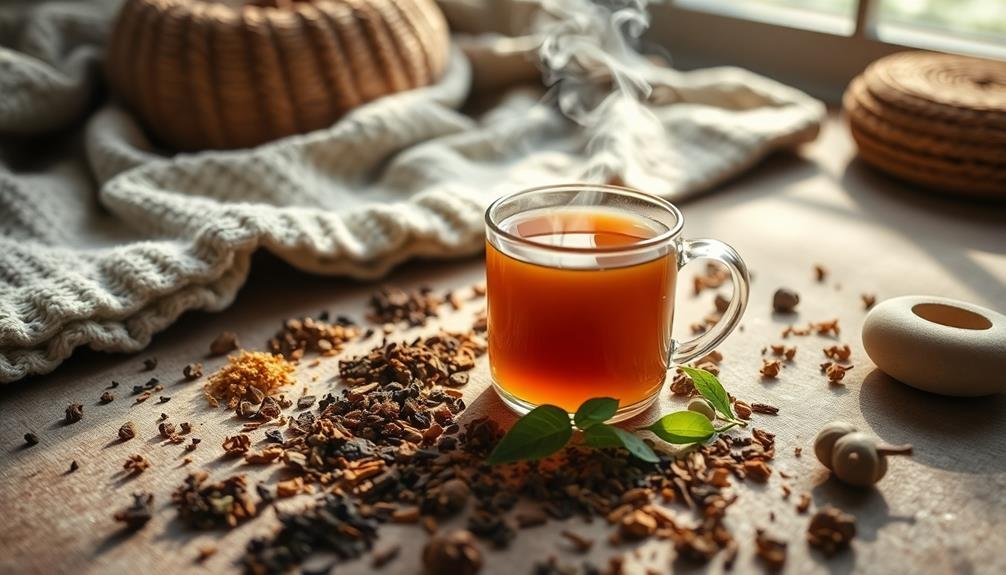
When you're looking to boost your immunity and manage stress, adaptogenic herbs can be powerful allies in your tea.
You'll find ancient wisdom in Ashwagandha, an Ayurvedic root known for its calming properties, while Rhodiola offers an energizing boost from the Arctic regions.
For a soothing effect, consider Holy Basil, also known as Tulsi, which has been revered in Indian tradition for its stress-relieving qualities.
Ashwagandha: Ancient Ayurvedic Root
Have you ever wondered about the secret to managing stress naturally? Seek no further than Ashwagandha, an ancient Ayurvedic root with powerful adaptogenic properties. This herb has been used for centuries to help the body cope with stress and maintain overall well-being.
When you incorporate Ashwagandha into your tea routine, you're tapping into a wealth of potential benefits. This exceptional herb can:
- Reduce cortisol levels, the body's primary stress hormone
- Improve sleep quality and combat insomnia
- Boost energy and mental clarity
- Enhance physical performance and endurance
- Support immune function and overall health
Ashwagandha's stress-relieving effects are particularly remarkable. By regulating your body's stress response, it can help you feel more balanced and resilient in the face of daily challenges.
Whether you're dealing with work pressures, relationship issues, or general anxiety, this adaptogenic herb may offer the support you need.
Adding Ashwagandha to your tea is simple. You can find it in powder or dried root form, and it blends well with other herbs for a delicious and effective stress-busting brew.
Start with a small amount and gradually increase as needed to experience its full benefits.
Rhodiola: Arctic Energy Booster
From the frigid depths of the Arctic tundra comes Rhodiola, a powerful adaptogenic herb that's been revered for centuries as a natural energy booster and stress reliever. This hardy plant thrives in harsh environments, and its root contains compounds that can help your body adapt to physical, mental, and environmental stressors.
When you're feeling fatigued or overwhelmed, Rhodiola can come to your rescue. It's known to combat exhaustion, enhance mental performance, and improve your mood. By adding Rhodiola to your tea, you're tapping into its ability to increase your body's resistance to stress and promote overall well-being.
Rhodiola's benefits extend beyond stress relief. It may also support your immune system, helping you fend off illnesses during challenging times. Additionally, this Arctic wonder has been linked to improved exercise performance and reduced recovery time for athletes.
To enjoy Rhodiola's benefits, steep a teaspoon of dried root in hot water for 5-10 minutes. You'll notice a slightly sweet, rose-like aroma and a mild, earthy flavor.
For best results, consume Rhodiola tea regularly, especially during periods of high stress or when you need an extra energy boost.
Holy Basil: Calming Tulsi
Moving from the Arctic to the warm, spiritual lands of India, we encounter another powerful adaptogenic herb: Holy Basil, also known as Tulsi. This revered plant has been used for thousands of years in Ayurvedic medicine to promote overall well-being and balance in the body.
As an adaptogen, Holy Basil helps your body cope with stress and maintain homeostasis. When you brew Holy Basil into a tea, you're tapping into its numerous health benefits. It's known to support your immune system, reduce inflammation, and help manage anxiety and depression.
The herb's calming properties can also improve sleep quality and lower cortisol levels, making it an excellent choice for those dealing with chronic stress.
Here are some key benefits of Holy Basil:
- Boosts immune function
- Reduces stress and anxiety
- Supports cognitive function
- Balances blood sugar levels
- Protects against environmental toxins
To incorporate Holy Basil into your routine, try brewing a cup of Tulsi tea in the morning or evening. You can also blend it with other herbs like chamomile or mint for a more complex flavor profile.
Anti-Inflammatory Tea Ingredients
Within the domain of immune-boosting teas, anti-inflammatory ingredients play an essential role. These powerful components can help reduce inflammation in your body, which is often linked to various health issues and a weakened immune system. By incorporating anti-inflammatory herbs and spices into your tea, you're taking a proactive step towards better health.
Some of the most effective anti-inflammatory tea ingredients include turmeric, ginger, green tea, rosemary, and cinnamon. Each of these offers unique benefits and flavors to enhance your tea-drinking experience. Here's a quick overview of their properties:
| Ingredient | Anti-inflammatory Compound | Additional Benefits |
|---|---|---|
| Turmeric | Curcumin | Antioxidant, pain relief |
| Ginger | Gingerols | Digestive aid, nausea relief |
| Green Tea | Catechins | Metabolism boost, heart health |
| Rosemary | Carnosic acid | Cognitive function, antimicrobial |
| Cinnamon | Cinnamaldehyde | Blood sugar regulation, antiviral |
When brewing your anti-inflammatory tea, consider combining two or more of these ingredients for a synergistic effect. You can also add a squeeze of lemon or a touch of honey to enhance the flavor and provide additional immune-boosting properties.
Vitamin C Packed Herbs
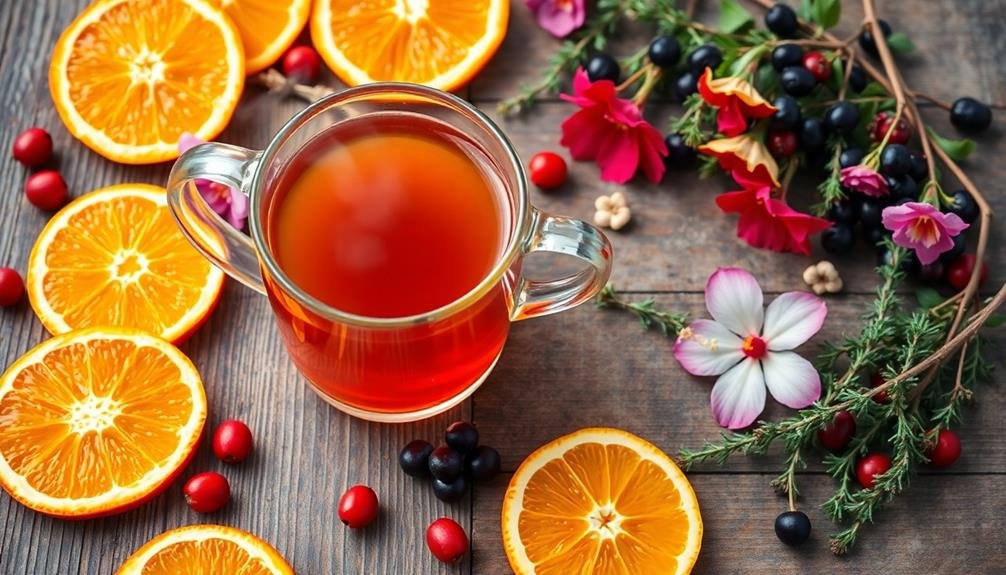
Alongside anti-inflammatory ingredients, vitamin C-rich herbs are essential for immune-boosting teas. Vitamin C is a powerful antioxidant that supports your body's defense mechanisms. By incorporating these herbs into your tea, you'll give your immune system a natural boost.
Here are some vitamin C-packed herbs to take into account for your immune-boosting tea:
- Rose hips
- Hibiscus
- Lemon balm
- Elderberry
- Schisandra berries
Rose hips, in particular, contain more vitamin C than oranges, making them an excellent choice for your tea. Hibiscus not only provides vitamin C but also adds a tart, invigorating flavor to your brew.
Lemon balm offers a subtle citrus taste while supporting your immune system. Elderberry, known for its immune-boosting properties, can be a delicious addition to your tea blend. Schisandra berries, though less common, pack a punch of vitamin C and other beneficial compounds.
When brewing your tea, steep these herbs for 5-10 minutes to extract their full nutritional benefits. You can combine them with other immune-boosting ingredients for a more potent blend.
Remember to consult with a healthcare professional before adding new herbs to your diet, especially if you have existing health conditions or are taking medications.
Antibacterial Properties of Tea Herbs
Harnessing the power of nature's pharmacy, many herbs used in tea possess potent antibacterial properties. These natural defenders can help fortify your immune system against harmful bacteria, potentially reducing the risk of infections.
You'll find that echinacea, a popular immune-boosting herb, contains compounds that may inhibit bacterial growth. Similarly, ginger's active components, like gingerols and shogaols, have been shown to combat various strains of bacteria effectively.
Another powerhouse is oregano, which contains carvacrol and thymol, two compounds with strong antibacterial effects. You can also turn to thyme, known for its thymol content, which has been used traditionally to fight respiratory infections.
Don't overlook garlic, either. While not typically used in tea, it can be infused into warm water for a potent antibacterial brew. Its allicin content is particularly effective against many types of bacteria.
Lastly, consider adding some peppermint to your tea. It contains menthol, which has demonstrated antibacterial properties in numerous studies.
Soothing Herbs for Respiratory Health
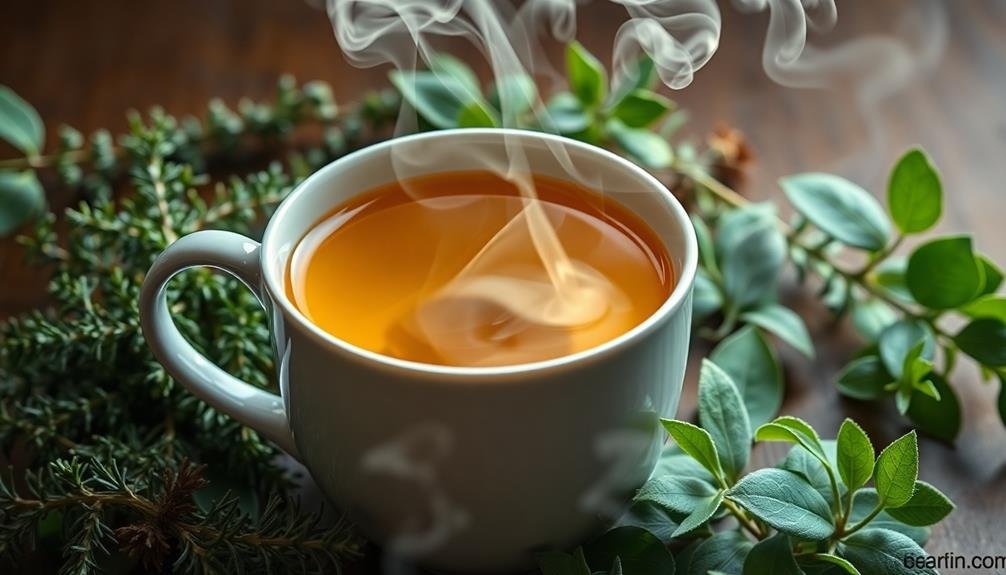
When it comes to respiratory health, certain herbs can work wonders in soothing irritated airways and easing breathing difficulties. These natural remedies have been used for centuries to alleviate symptoms of coughs, colds, and other respiratory issues. By incorporating these herbs into your tea, you're not only enjoying a comforting beverage but also supporting your respiratory system.
Here are some of the most effective herbs for respiratory health:
- Thyme: Contains powerful expectorant properties
- Peppermint: Helps clear congestion and soothes sore throats
- Marshmallow root: Forms a protective layer in the throat and lungs
- Licorice root: Reduces inflammation and fights respiratory infections
- Mullein: Eases coughing and helps expel mucus
These herbs work together to provide relief from various respiratory issues. Thyme and peppermint can help clear congestion, while marshmallow root and licorice root soothe irritated tissues.
Mullein is particularly effective in combating persistent coughs. By regularly consuming teas made with these herbs, you'll support your respiratory health and potentially reduce the severity and duration of common ailments.
Remember to consult with a healthcare professional before adding new herbs to your routine, especially if you have pre-existing health conditions or are taking medications.
Herbal Teas for Digestive Support
While respiratory health is essential, your digestive system also plays a key role in overall wellness. Herbal teas can provide significant support for your digestive processes, offering relief from common issues and promoting better gut health.
Several herbs are known for their digestive benefits when consumed as tea. Peppermint, for instance, can help soothe an upset stomach and reduce bloating. Ginger tea is excellent for combating nausea and improving digestion. Chamomile, known for its calming properties, can also ease digestive discomfort.
Here's a quick reference guide to some digestive-supporting herbal teas:
| Herb | Benefits |
|---|---|
| Peppermint | Reduces bloating, soothes stomach |
| Ginger | Fights nausea, aids digestion |
| Chamomile | Calms digestive discomfort |
| Fennel | Relieves gas, promotes regularity |
| Dandelion | Supports liver function, detoxifies |
Incorporating these teas into your daily routine can help maintain a healthy digestive system. You'll find that many of these herbs not only support digestion but also contribute to overall immune function. By addressing both respiratory and digestive health, you're taking a thorough approach to boosting your immunity and well-being.
Synergistic Blends for Optimal Benefits
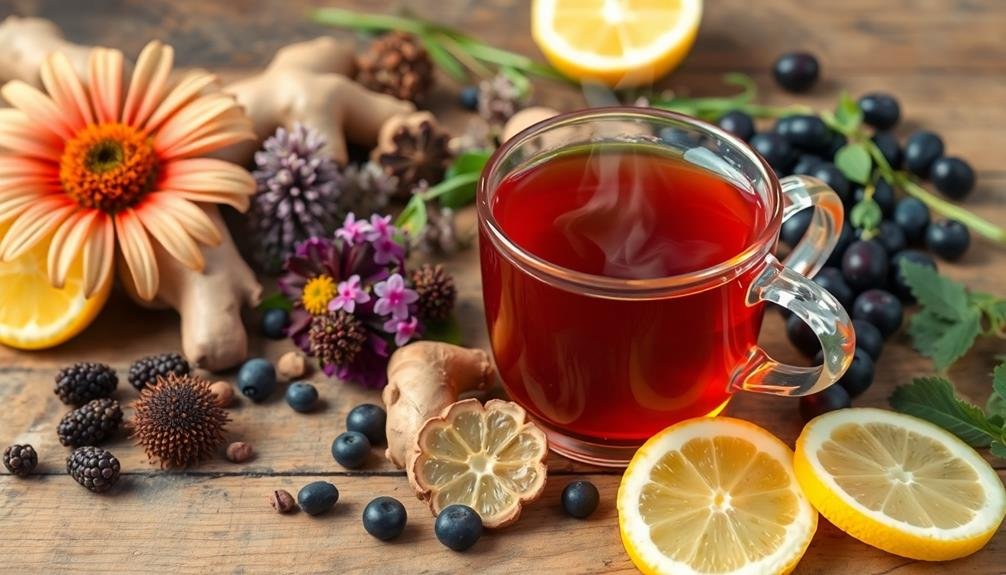
As you explore the world of immune-boosting herbal teas, you'll discover that combining certain herbs can amplify their beneficial effects.
These synergistic blends can offer a more potent immune boost than individual herbs alone. By carefully selecting complementary ingredients, you're creating a powerful defense against illness.
When crafting your immune-boosting tea blend, consider these popular combinations:
- Echinacea and elderberry for enhanced antiviral properties
- Ginger and turmeric to reduce inflammation and support overall immunity
- Astragalus and reishi mushroom for adaptogenic benefits
- Rosehip and hibiscus for a vitamin C-rich infusion
- Lemon balm and holy basil to combat stress and support immune function
Seasonal Herbs for Immune Defense
You'll find that nature provides different immune-boosting herbs throughout the year.
In spring and summer, you can harness the power of fresh, vibrant herbs like lemon balm and elderflower.
As the weather cools, you'll want to shift your focus to warming herbs like ginger and cinnamon for fall and winter immune defense.
Spring and Summer Selections
Nature's bounty blossoms during spring and summer, offering a variety of immune-boosting herbs perfect for invigorating teas. As the weather warms, you'll find an abundance of fresh, vibrant herbs that can help fortify your immune system while providing revitalizing flavors.
These seasonal selections aren't only delicious but also packed with antioxidants and vitamins to keep you healthy during the warmer months.
Here are five spring and summer herbs to contemplate for your immune-boosting teas:
- Lemon balm: A citrusy herb that supports stress relief and immune function
- Elderflower: Known for its antiviral properties and ability to reduce inflammation
- Mint: Aids digestion and provides a cooling effect while supporting immune health
- Chamomile: Soothes the nervous system and boosts overall immunity
- Echinacea: A powerful immune stimulant that's especially effective when used fresh
Fall and Winter Favorites
The fall and winter seasons bring a unique set of immune-boosting herbs that thrive in cooler temperatures. As the weather cools down, you'll find a variety of herbs that can help fortify your body's defenses against seasonal illnesses.
Elderberry takes center stage during these colder months. It's packed with antioxidants and has been shown to reduce the severity and duration of colds and flu. You can easily add dried elderberries to your tea blends for a flavorful and immune-boosting kick.
Another fall favorite is echinacea. This powerful herb stimulates your immune system and can help fight off infections. It's particularly effective when consumed at the first sign of illness.
Don't forget about astragalus root, a staple in traditional Chinese medicine. It's known for its ability to enhance the immune system and increase your body's resistance to stress.
Ginger is a versatile herb that's perfect for fall and winter teas. It warms the body, aids digestion, and has potent anti-inflammatory properties. Pair it with lemon and honey for a soothing, immune-boosting drink.
Lastly, consider adding some rosehips to your tea. They're an excellent source of vitamin C and can help support your immune system throughout the colder months.
Customizing Your Immune-Boosting Tea
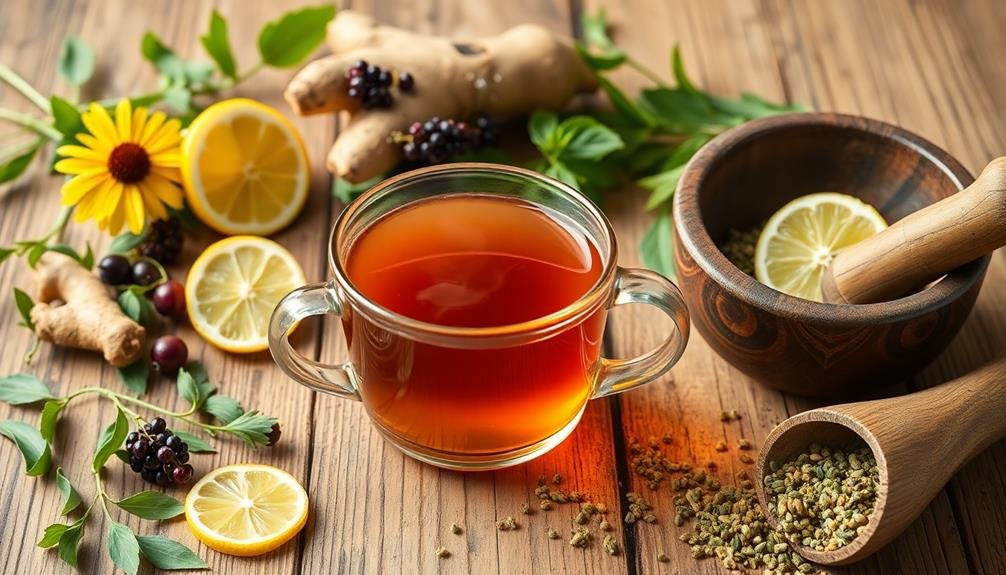
Creating your own personalized immune-boosting tea blend allows you to tailor the flavor and benefits to your specific needs and preferences. Start by selecting a base herb, such as echinacea or elderberry, known for their immune-supporting properties.
Then, add complementary herbs to enhance the flavor and boost the overall health benefits. Reflect on including ginger for its anti-inflammatory properties or lemon balm for its calming effects.
Experiment with different ratios to find your perfect blend. You might prefer a stronger, more robust flavor or a milder, more delicate taste. Don't forget to add a touch of sweetness with honey or stevia if desired.
Remember that some herbs may interact with medications, so consult your healthcare provider before incorporating new herbs into your routine.
Here are some key points to reflect on when customizing your immune-boosting tea:
- Choose organic, high-quality herbs for maximum potency
- Store your blend in an airtight container away from light and heat
- Start with small batches to test different combinations
- Reflect on your specific health goals when selecting herbs
- Be mindful of potential allergies or sensitivities to certain herbs
Frequently Asked Questions
Are Immune-Boosting Herbal Teas Safe for Pregnant Women?
While some immune-boosting herbal teas can be safe during pregnancy, you'll need to be cautious. It's best to consult your healthcare provider before consuming any herbal teas, as some may have adverse effects on your pregnancy.
How Long Does It Take to See Effects From Immune-Boosting Teas?
You'll typically notice effects from immune-boosting teas within a few weeks of regular consumption. However, individual results may vary. It's important to maintain a consistent routine and pair your tea drinking with a healthy lifestyle for ideal benefits.
Can Children Drink Immune-Boosting Herbal Teas?
Yes, children can drink immune-boosting herbal teas, but you should be cautious. Always consult your pediatrician first, use mild herbs, and introduce them gradually. Don't give large quantities, and avoid teas with caffeine or strong medicinal properties.
Do Immune-Boosting Teas Interact With Prescription Medications?
Yes, immune-boosting teas can interact with prescription medications. You should always consult your doctor before adding them to your routine. They may affect drug absorption or effectiveness, so it's essential to be cautious and informed.
Are There Any Side Effects Associated With Drinking Immune-Boosting Herbal Teas?
While generally safe, immune-boosting herbal teas can have side effects. You might experience allergic reactions, digestive issues, or headaches. They can also interact with medications. It's best to consult your doctor before regularly consuming these teas.
In Summary
You've discovered the power of immune-boosting herbs in your tea. By choosing antioxidant-rich, adaptogenic, and anti-inflammatory ingredients, you're giving your body natural support. Don't forget to include vitamin C-packed herbs and those that aid digestion. Experiment with synergistic blends and seasonal options to tailor your tea to your needs. Remember, you're not just sipping a warm beverage; you're actively supporting your immune system with every cup. Embrace this delicious way to stay healthy!

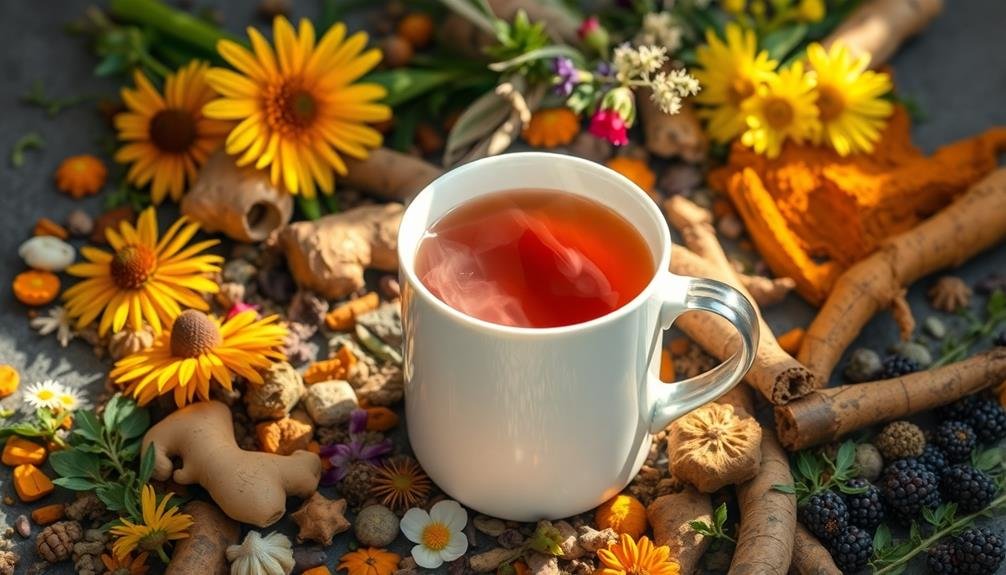



Leave a Reply